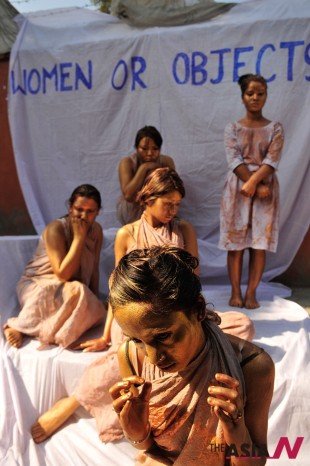Nearly 300,000 Nepalese women trafficked to Indian brothels

Nepalese activists paint themselves during a protest on the fiftieth day of a campaign against the violence on women in Kathmandu, Nepal, Feb. 14, 2013. (Photo : Xinhua)
Trafficking of women and girls and supplying them in the sex markets of India and other countries is still one of the big social problems in Nepal. In the past, the innocent Nepalese girls and women used to be sold only in the brothels of Mumbai, India. But in recent years, they are taken to newer destinations in India and other countries by luring them in many ways. Even a few Nepalese girls have reached Africa as dance and bar girls through the traffickers. A few months ago, local newspapers printed stories and photos of the Nepalese girls working in a dance bar in Africa.
Although there is no official record of the Nepalese girls and women who have been trafficked and forced to work as sex workers in different brothels in India and other countries, Anuradha Koirala, founder and chair of Maiti Nepal, an organisation set up to rescue and rehabilitate trafficked women and girls, estimates their number to be around 300,000.
“These days the girls and women from different parts of Nepal are taken abroad under different pretexts, many of them with promises of good jobs, and are sold in the brothels of India and elsewhere,” Koirala said.
According to her, the traffickers have of late explored newer markets in India and other countries as well as new tactics to hoodwink the poor women. Indian states of Assam, Meghalaya and Nagaland have emerged as new sex markets for the trafficked Nepalese women. Three months ago, Maiti Nepal rescued a widow and a mother of three from a brothel of Assam, she informed. The girls trafficked are also sold in the brothels of the towns located on the Nepal-India border.
According to Bishwo Khadka of Maiti Nepal, even Kathmandu has emerged as a new destination for the girl traffickers as they supply girls for the cabin and dance restaurants of the city.
Maiti Nepal rescues victims
Maiti Nepal is now running its rescue offices at 11 different entry points of the Nepal-India border and it has intercepted 2,809 women from being trafficked in 2013 while it rescued 142 victims during the same period. Currently, it has rehabilitated 105 rescued women and girls in its two rehab centres in Kathmandu and Itahari in eastern Nepal. Similarly, 66 girls and women who were infected with HIV/AIDS while working as forced sex workers are taking shelter at its two hospices, one in Kathmandu and another in Jhapa. Normally, the brothels throw away the women after they are found to be infected with HIV/AIDS.
More worrying is when many girls heading to the Gulf countries as migrant workers get sold in the middle and those who reach the countries where they were promised jobs, undergo sexual abuse. Three years ago, a Nepali girl killed herself after being unable to tolerate the sexual abuse in one of the Gulf countries. A few months ago, a broker, who took a group of girls to India promising them good jobs in the Gulf countries, sold a few of them in the middle.
“He had taken even the girls who had not prepared their passports, and promised to send them to the Gulf countries. But in New Delhi, India, he sold the girls who had no passport with them,” Koirala recalled the pathetic story of the poor Nepalese girls. The government of Nepal does not allow women to go to Gulf countries as migrant workers, but many Nepali girls have reached Kuwait and Saudi Arabia via India. It is said that every day about 1,600 girls get trafficked from Nepal. However, there is no documentation to prove this claim.
According to the record of Nepal Police, it received 445 complaints about the trafficking of women and girls in the past three years. Similarly, 144 girls and women were trafficked in 2013 and it filed cases against 132 perpetrators, 36 of them women. Similarly, 33 criminals convicted in human trafficking were at large. Maiti Nepal has been trying its best to free Nepal from the clutches of human traffickers. Since its establishment 21 years ago, it has succeeded to bring 900 individuals involved in trafficking women and girls to book.
The high illiteracy rate among women, poverty, lack of job opportunities and political protection of the criminals are blamed for the flourishing trade of women trafficking in Nepal.




























































